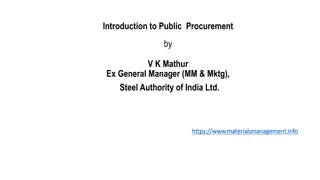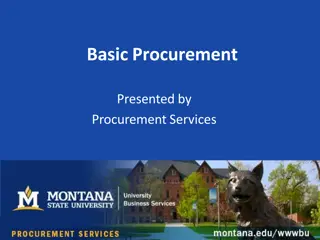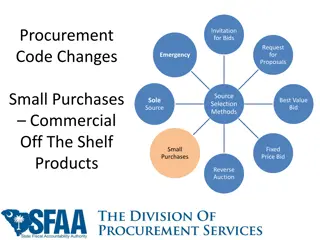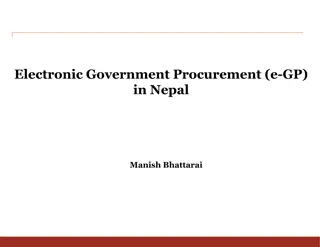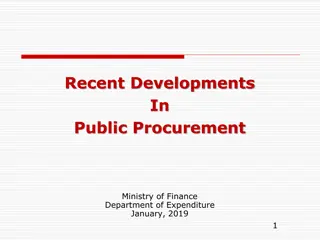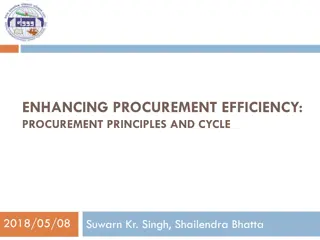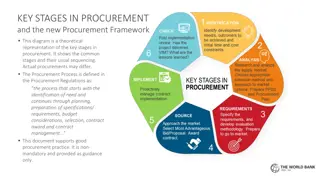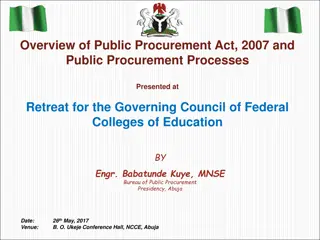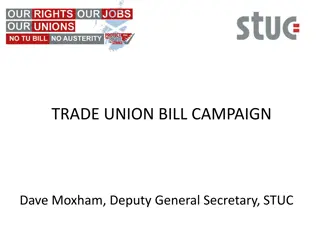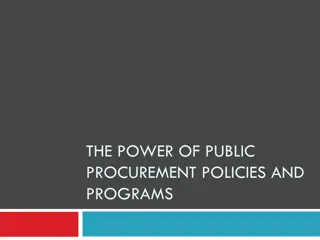National Procurement Bill Overview
The presentation provides an overview of the Public Procurement Bill introduced in the National Assembly in 2023. The aim is to regulate public procurement, ensure transparency and efficiency, and promote socio-economic objectives through a unified framework. The bill addresses principles of ethics, resource use, and accountability in line with constitutional requirements. By establishing a single procurement framework, it aims to streamline the current fragmented regime and overcome historical challenges.
Download Presentation

Please find below an Image/Link to download the presentation.
The content on the website is provided AS IS for your information and personal use only. It may not be sold, licensed, or shared on other websites without obtaining consent from the author.If you encounter any issues during the download, it is possible that the publisher has removed the file from their server.
You are allowed to download the files provided on this website for personal or commercial use, subject to the condition that they are used lawfully. All files are the property of their respective owners.
The content on the website is provided AS IS for your information and personal use only. It may not be sold, licensed, or shared on other websites without obtaining consent from the author.
E N D
Presentation Transcript
PRESENTED BY: PUBLIC PROCUREMENT BILL [B 18B-2023] WILLIE MATHEBULA Title: CHIEF DIRECTOR: SCM POLICY AND LEGAL Date: 06 February 2024 SELECT COMMITTEE ON FINANCE, NATIONAL COUNCIL OF PROVINCES Briefing by National Treasury
2 INTRODUCTION The Public Procurement Bill was introduced in the National Assembly on 30 June 2023 and passed by National Assembly in Dec 2023 The aim of the presentation is to outline- the key principles to which the Bill prescribes broadly aspects regulated in detail in the Bill; a range of other aspects to be prescribed through Ministerial regulations within the framework in the Bill Government procurement policy is to leverage public procurement to promote broad socio-economic objectives
3 PURPOSE AND BACKGROUND PURPOSE OF BILL The aim of the Bill is to regulate public procurement and to prescribe a framework within which preferential procurement must be implemented BACKROUND Section 195 of the Constitution requires that national legislation must, among others, ensure the promotion in public administration of the following principles: a high standard of professional ethics efficient, economic and effective use of resources development-oriented, accountability and transparency In terms of section 216(1) of the Constitution, national legislation must prescribe measures to ensure both transparency and expenditure control in each sphere of government by introducing, among others, uniform treasury norms and standards Section 217(1) of the Constitution stipulates that procurement by organs of state and identified institutions, must occur in accordance with a system which is fair, equitable, transparent, competitive & cost-effective
4 PURPOSE AND BACKGROUND(cont) The Constitution in section 217(2) allows for organs of state to implement a procurement policy providing for categories of preference in the allocation of contracts and the protection or advancement of persons disadvantaged by unfair discrimination Section 217(3) of the Constitution requires national legislation to prescribe a framework within which the procurement policy must be implemented The public procurement regime in South Africa is currently fragmented as there are several laws which regulate procurement across the public administration. This fragmentation results in confusion as different procurement rules apply for different organs of state. Some of these laws pre-date the constitutional order brought about in 1994. It is important and necessary, considering the history of South Africa and the developments after the Constitution took effect, to have legislation that creates a single framework regulating procurement, in line with all applicable stipulations of the Constitution and that effectively addresses the socio- economic challenges of South Africa.
5 ARRANGEMENT OF CHAPTERS CHAPTER 1 CHAPTER 2 CHAPTER 3 CHAPTER 4 CHAPTER 5 CHAPTER 6 CHAPTER 7 DEFINITIONS, OBJECTS, APPLICATION AND ADMINISTRATION OF ACT PUBLIC PROCUREMENT OFFICE, PROVINCIAL TREASURIES AND PROCURING INSTITUTIONS PROCUREMENT INTEGRITY & DEBARMENT PREFERENTIAL PROCUREMENT GENERAL PROCUREMENT REQUIREMENTS DISPUTE RESOLUTION GENERAL PROVISIONS Part 1: Reconsideration of decision to award Investigations Delegations Limitation of liability Offences Exemption Deviation Regulations Transitional measures Amendment & repeal of legislation refer to Schedule to Bill Procurement system and methods Use of technology Access to procurement processes & information Part 2: Public Procurement Tribunal Part 3: Review process Part 4: Stand still process
6 CHAPTER 1 - DEFINITIONS For purposes of the interpretation of the Bill, various terms are defined Key definitions include: capital asset economically active population emergency immediate family members infrastructure national security open data procurement procuring institution public-private partnership Public Procurement Office transformation Tribunal
7 CHAPTER 1 OBJECTS (clause 2) Objects of the Act are, with due regard to sections 195, 216 and 217 of the Constitution, to introduce uniform treasury norms and standards for all procuring institutions to implement their procurement systems as envisaged in section 217(1), read with section 216(1), of the Constitution; and determine a preferential procurement framework for all procuring institutions within which to implement their procurement policies as envisaged in section 217(2) and (3) of the Constitution These objects must, among others ensure efficient, effective and economic use of public resources through, among others, the assessment of the costs, benefits and risks; advance ethical conduct and combat corruption through access to procurement information and other transparency measures and introducing enforcement and appropriate sanctions for transgressors advance transformation, beneficiation and industrialisation; stimulate economic development improve efficiency and effectiveness in procurement by streamlining procurement processes, amongst others, through the use of technology provide for effective and expedited dispute resolution of procurement related decisions promote innovation and sustainable development
8 CHAPTER 1 APPLICATION (clause 3) Clause 3 provides that the Act is to apply to a department as defined in section 1 of the Public Finance Management Act, a constitutional institution listed in Schedule 1 to the Public Finance Management Act, a public entity listed in Schedule 2 or 3 to the Public Finance Management Act, a municipality as defined in the Municipal Finance Management Act, a municipal entity as defined in the Municipal Finance Management Act. Provision is also made for the application of Chapter 4 (preferential procurement) to Parliament and provincial legislatures
9 CHAPTER 2 - PUBLIC PROCUREMENT OFFICE, PROVINCIAL TREASURIES AND PROCURING INSTITUTIONS The Bill proposes establishment of a Public Procurement Office within National Treasury and provides for its functions, which include: issuing instructions and promoting compliance by procuring institutions promoting and taking measures to maintain the integrity of procurement system guiding and supporting officials and procuring institutions to ensure compliance promote the use of technology and innovation and learning towards modernisation of the public procurement system implementing measures to ensure transparency in procurement issuing guidelines (clauses 4 and 5) Clause 6 provides for the functions of provincial treasuries Clause 7 stipulates that accounting officers and authorities make decisions obo procuring institutions in terms of the Act The duties of procuring institutions are set out in clause 8
10 CHAPTER 3 - PROCUREMENT INTEGRITY AND DEBARMENT Provision is made for codes of conduct for officials, bidders, suppliers, members of the Tribunal and others person involved in a procurement process (clause 9), and specific conduct measures (clause 10) Due diligence and declaration of interest regarding persons involved in procurement (clause 11) Prohibiting undue influence and interference (clause 12) Provides for automatic exclusion of specified persons from submitting bids, e.g. public officer bearers, employees in public administration (clause 13) Measures for functionaries in procurement on how to deal with directions to inconsistent with the Act (clause 14) Provision for debarment of bidders and suppliers (clause 15)
11 CHAPTER 4: PREFERENTIAL PROCUREMENT CONTEXT The first iteration of the framework to be prescribed by national legislation (as per s217(3) of the Constitution was the PPPFA and the first version of the preferential procurement regulations issued in 2001: Limitation: only providing for preference in the allocation of contracts (s217(2)(a)), but not the protection or advancement of persons or categories of persons (s217(2)(b)) Despite this limitation, there was a clear line of sight to the Constitution in that the specific goals mentioned in the PPPFA clearly referenced preference for persons or categories of persons disadvantaged by unfair discrimination on the basis of race, gender and disability Empowerment was measurable and the premium was quantifiable Diluted the impact of preference by combining the functionality score with the score for price and empowerment (preference). This was remedied by the court when it was held that functionality should be used to determine whether the bidder/tenderer can deliver on the contract and provide the necessary quality. Thereafter, a price and preference evaluation should occur. The second iteration of the framework kept the PPPFA in place but revised the regulations in 2011 to replace specific goals with B-BBEE status level of contributor, based on a Cabinet resolution. It also introduced designations for local production and content. It is submitted to that these provisions were outside the scope of the law but were not challenged.
12 CHAPTER 4: PREFERENTIAL PROCUREMENT CONTEXT The third iteration of the regulations was gazetted in 2017. The introduction of the B- BBEE elements in the Preferential Procurement Regulations, 2011 diluted the objectives of the PPPFA and and undermined the advancement of specific preferential goals, such as black persons, women and persons with disabilities. To this end, the regulations had the following implications: Advantages: Greater and more meaningful measures for empowerment, as acknowledged by both the minority and majority judgment of the ConCourt. The 2017 regulations also provided for creation of a preferential procurement policy that is flexible but standardised Challenge: It was not the minister s place to determine policy on behalf of the institution on such measures for empowerment because of the manner in which the PPPFA was drafted (i.e. it gave the power to the organs of state to determine policy) The fourth iteration of the regulations in 2022 had to address the challenges referred to in the Concourt judgment as well as ensuring that the regulations remain within the scope of the PPPFA, unlike in the 2011 and 2017 iterations that replaced specific goals with B-BBEE and provided for local production and content as a disqualification criterion
13 CHAPTER 4: PREFERENTIAL PROCUREMENT CONTEXT Chapter 4 within the context of the broader Public Procurement Bill This preferential procurement framework should be understood within the context of the procurement system envisaged in section 217(1) of the Constitution. Chapter 4 is also linked to Chapter 5, which provides for the framework for the system to be prescribed by regulation within which procuring institutions must implement their policies. It is within this context that the trade-off between these competing objectives and principles is maximised and balanced. From the lessons learnt, it became apparent that there is a need for a preferential procurement policy framework that is responsive and enabling to deliver on section 217(2) and (3) of the Constitution and other horizontal policy objectives, such as a mechanism to give effect to set-asides for women and the development of industry masterplans, which may lead to designation of sectors, where possible
14 CHAPTER 4: PREFERENTIAL PROCUREMENT CONTEXT There are various narratives that propagate negative views regarding preferential procurement, and it is important to appreciate that PREFERENTIAL PROCUREMENT IS NOT: - Reverse discrimination against white owned and large enterprises - Lack of competition - Deliberately paying unsubstantiated and unsustainable high prices - Acceptance of poor or low standard of work/quality - Corruption or an illegal policy The Bill, in Chapter 4, seeks to address the fundamental Constitutional provisions in section 217(2) and (3), and provides for regulations to address negotiations with bidders, which is envisaged would include, amongst others, the negotiation of a fair market price to prevent government paying exorbitant prices for contracts awarded
15 CHAPTER 4: PREFERENTIAL PROCUREMENT RATIONALE FOR EXPATIATION OF CHAPTER 4 1. Consideration of the procurement section in the Constitution: Section 217 Procurement (1) When an organ of state contracts for goods or services, it must do so in accordance with a system which is fair, equitable, transparent, competitive and cost-effective. (2) Subsection (1) does not prevent the organ of state from implementing a procurement policy providing for (a) categories of preference in the allocation of contracts; and (b) the protection or advancement of persons, or categories of persons, disadvantaged by unfair discrimination. (3) National legislation must prescribe a framework within which the policy referred in subsection (2) must be implemented. Therefore, the Constitution provides for equality before the law, redressing the imbalances of the past and preferential treatment of previously disadvantaged person when organs of state procure goods and services 15 15
16 CHAPTER 4: PREFERENTIAL PROCUREMENT RATIONALE FOR EXPATIATION OF CHAPTER 4 cont In expatiation Chapter 4, the following principles and approach were adopted: 2. Consider, to the extent possible, comments that were made by stakeholders, which included, amongst others: that the framework is not visible in the current Chapter 4 in that it is vague and unintelligible, and does not represent the framework envisaged in section 217(3) of the Constitution that it was not clear how bids would be evaluated and awarded 3. Ensure that the expanded Chapter 4 provides a clearer framework for the envisaged preferences in the allocation of contracts and protection and advancement of persons or categories of persons disadvantaged by unfair discrimination
17 CHAPTER 4: PREFERENTIAL PROCUREMENT RATIONALE FOR EXPATIATION OF CHAPTER 4 4. Brought in provisions from previous sets of preferential prescripts, but not in a copy and paste format, rather in a manner that aligned with the aims of section 217(2) and (3) of the Constitution, especially considering the majority judgment in the matter between Afribusines (Sakeliga) and the Minister of Finance in paragraph 116 of the ConCourt judgement: "Happily, both the first judgment and this judgment and, indeed, the Minister understand the impugned regulations to do what is envisaged in section 217(2) of the Constitution. These impugned provisions included those relating to prequalification for preferential procurement and subcontracting as a condition of bid. 5. In the aforementioned Constitutional Court Judgment, Justice Mhlantla stated that The stand-alone reading of section 217(1), which ignores section 217(2), is not only a disservice to statutory interpretation, but also ignores the founding values of the Constitution. This statement confirmed the view that drafting of national legislation that must provide a framework to give effect to section 217(2) of the Constitution must take into account the founding values of the Constitution and the need to deliberately redress past discriminatory practices and provide for measures for preference that will make a meaningful difference to the lives of South Africans who have suffered under the yoke of oppression.
18 CHAPTER 4: PREFERENTIAL PROCUREMENT MULTIPLE AND DIVERGENT VIEWS REGARDING CHAPTER 4 1. There was a view that the framework should be discretionary, not mandatory, while others were of the view that redress is a government imperative and therefore should be applied by all procuring institutions. - In response to whether or not it is discretionary for procuring institutions to apply the framework, Parliament is entitled and required to enact legislation laying down a framework for preferential procurement policy. The question of how tight or loose that framework is that is, how much discretion it affords to organs of state to develop their own policies or depart from the national policy is for Parliament to determine. 2. There were views expressed that the framework should be the centralised policy from which procuring institutions may implement their preferential procurement policies, while others felt that procuring institutions should have flexibility in how they implement preferential policies. After assessing the various views submitted, a proposal for expatiation of Chapter 4 was submitted to SCOF and after deliberations the Bill was passed by the National Assembly.
19 CHAPTER 4: PREFERENTIAL PROCUREMENT PROVISIONS IN BILL AS PASSED BY NATIONAL ASSEMBLY Preferential framework and procurement policies (clause 16) This clause makes it clear that the framework set out in the chapter is giving effect to section 217(2) and (3) of the Constitution. It also makes it mandatory for procuring institutions to implement preferential procurement in a manner envisaged in the framework. Set asides for preferential procurement (clause 17) Setting aside (ringfencing) for certain categories of persons to provide for protection and advancement of persons historically disadvantaged by unfair discrimination Provides for regulations to set targets for set-asides Provision is made for instances if not possible to find suppliers within those categories of persons - the provision for empowerment will however not be lost but provided for in terms of clause dealing with pre-qualification criteria Procuring institutions must record the analysis that informed its inability to procure using a set aside, and then report to the PPO and provincial treasuries Application of this clause will be limited to the thresholds and conditions as prescribed by regulation
20 CHAPTER 4: PREFERENTIAL PROCUREMENT PROVISIONS IN BILL AS PASSED BY NATIONAL ASSEMBLY Prequalification criteria for preferential procurement (clause 18) Prequalification will apply to procurement with a higher threshold than set asides List of persons to be reached by this clause is broader than the list provided for in the Set Aside clause During the SCOF process, the reference to the preference points system was replaced by the reference to prescribedcriteria to enable the opportunity to research further and to apply potential alternative measures of preference and evaluation and award criteria This provision also compels the private sector to contribute to transformation and supplier development by recognizing the B-BBEE levels of contribution and making provision for subcontracting
21 CHAPTER 4: PREFERENTIAL PROCUREMENT PROVISIONS IN BILL AS PASSED BY NATIONAL ASSEMBLY Subcontracting as condition of bid (clause 19) For contracts above a prescribed amount, a procuring institution must provide for subcontracting a prescribed percentage of the contract to certain persons and categories of persons List of persons to be reached by this clause is aligned with the list provided for in the prequalification for preferential procurement clause (clause 18) The term feasible is used in recognition of the fact that it may not always be possible to subcontract in all tenders due to the nature of some bids Provision is made that the persons or categories of persons identified for empowerment must be citizens, or owned by citizens, of South Africa in accordance with prescribed percentages. As with the prequalification clause, it was envisaged that the application of subcontracting as a condition of bid will also be paired with the preference points systems as prescribed. However, during the SCOF process, this reference to the preference points system was also replaced by the reference to prescribedcriteria to enable the opportunity to research further and to apply to potential alternative measures of preference and evaluation and award criteria.
22 CHAPTER 4: PREFERENTIAL PROCUREMENT PROVISIONS IN BILL AS PASSED BY NATIONAL ASSEMBLY Designation of sectors for local production and content (clause 20) In terms of this clause, the function to designate sectors, sub-sectors and products is conferred upon the Minister responsible for trade, industry and competition as industrial and trade policy falls within that Ministry s mandate It also stipulates that bids that do not meet the minimum requirement for local content are unacceptable bids and thus disqualified from further evaluation Unlike the way in which designations were previously determined, this clause provides for proposed designations to be gazetted and for the public to be given an opportunity to provide comments Furthermore, the Minister of Finance is also provided the opportunity to comment on the proposed designation During the SCOF process, the preference points system was replaced by the reference to prescribedcriteria to enable the opportunity to research further and to apply to potential alternative measures of preference and evaluation and award criteria.
23 CHAPTER 4: PREFERENTIAL PROCUREMENT PROVISIONS IN BILL AS PASSED BY NATIONAL ASSEMBLY Other preference measures (clause 21) Provision is that if sections 17, 18, 19 and 20 are not able to be applied, preferences must be allocated as prescribed This is meant to ensure that even if the measures provided for in this chapter are not practicable for some reason, transformation objectives are not compromised Measures to advance sustainable development (clause 22) Measures for beneficiation & innovation, advancing creation of jobs, intensification of labour absorption & development of small enterprises within particular geographical area (clause 23) Contracting conditions (clause 24) The above provisions will be expanded upon in regulations, but it was important that enabling provisions were set out in the primary legislation
24 CHAPTER 4: PREFERENTIAL PROCUREMENT IMPACT OF PREFERENTIAL PROCUREMENT FRAMEWORK Although apartheid was dismantled a number of years ago, there is still a need to eradicate its socio-economic legacy and advance policies that build an inclusive economy and promote social unity This framework provides a menu of preference that must be followed in the prescribed order and the options of categories that seeks to provide preference in the allocation of contracts and the protection and advancement of persons or categories of persons disadvantaged by unfair discrimination It goes further than the PPPFA in that it does not merely provide for preference points systems, but other measures that will ensure meaningful empowerment of the previously disadvantaged 24
25 CHAPTER 5 GENERAL PROCUREMENT REQUIREMENTS The Chapter provides for the procurement systems and methods: The Minister must prescribe, by regulation, a framework within which procuring institutions must implement the procuring system, which includes (a) a strategic approach to procurement (i) in other countries (ii) for infrastructure, capital assets and goods or services related to maintenance of infrastructure and capital assets (iii) for the disposal and letting of assets (iv) to promote innovation (b) types of procurement methods (c) the requirements and procedure to be followed for each prescribed method (clause 25(1) The Minister may determine (a) by notice in the Gazette, procurement thresholds (b) different thresholds for (i) different categories of procuring institutions (ii) different categories of procurement (clause 25(2))
26 CHAPTER 5 GENERAL PROCUREMENT REQUIREMENTS The use by a procuring institution of another organ of state to provide goods and services are to be determined by regulation (clause 26) Measures to prevent abuse of procurement system, e.g. investigate allegations of corruptions, rejecting recommendation to award and cancellation of contracts in specified circumstance (clause 27) All procuring institutions are to establish a procurement function in their institutions (clause 28) The bid committee system is to be prescribed by regulation to cater for different types or procurement (clause 29) Public Procurement Office is to develop the components of an ICT procurement system over time. Procuring institutions must use the components as they became operational (clause 30). General requirement for procuring institutions to use of technology in procurement (clause 31) Measures for access to procurement processes are to be determined in regulations (clause 32) Clause 33 provides for the disclosure of procurement information and its format Clause 34 deals with protection of confidential information including personal information
27 CHAPTER 6 DISPUTE RESOLUTION The Chapter provides for a right of the bidder to seek a reconsideration by a procuring institution of its decision to award a bid and, if dissatisfied, then a review by a Tribunal (clauses 37 and 49) This Chapter provides for the establishment of a Public Procurement Tribunal, its composition, the qualifications of the members and other relevant provisions for the functioning of the Tribunal (clauses 38-48) The Tribunal may also review a debarment order issued by a procuring institution against a bidder or supplier (clause 50) An application made to the Tribunal is to heard by a panel constituted by the Chairperson of the Tribunal (clause 47) A procuring institution is prohibited from awarding a contract during the reconsideration or review proceedings (clause 55) A party dissatisfied with a Tribunal order may institute judicial review in terms of Promotion of Administrative Justice Act (clause 54)
28 CHAPTER 7 GENERAL PROVISIONS Provision is made for the Public Procurement Office to investigate any procurement related matter for purposes of establishing any non-compliance with the Act (clauses 56-58) Clause 59 enables functionaries to delegate powers and duties The Bill provides for the criminalisation, among others, of conduct of a person who knowingly gives false or misleading information or evidence interferes with or exerts undue influence on any official of a procuring institution or a member of the Tribunal in the performance of their functions connives or colludes to commit a corrupt, fraudulent, collusive or coercive or obstructive act related to procurement causes loss of public assets or funds as a result of negligence (clause 61) Limitation of liability for powers and duties performed in good faith in terms of the Act (clause 60) Provision is made for exemptions from the provisions of the Act and regulations, as well as departures from instructions (clauses 62 and 63)
29 CHAPTER 7 GENERAL PROVISIONS The Minister of Finance is to make regulations regarding- all matters specified for regulations elsewhere in the Bill (where the term prescribed is used), such as preferential procurement matters, a procurement system, procurement partnership and transversal term contracting and the use of another organ of state for goods and services list of other matters in clause 64(1) Consultation with relevant Ministers, public consultation process and submission Parliamentary scrutiny, are provided for in clause 64(2)-(6) Provision is made that different regulations- may make made for different categories of procuring institutions and different categories of procurement must be made regarding procurement of infrastructure and capital assets and goods & services related thereto (clause 64(7)) Clause 65 provides a public consultation process for instructions to be issued by the Public Procurement Office methods including public-private
30 CHAPTER 7 GENERAL PROVISIONS Provision is made for amendments to, and the repeal of, 16 Acts listed in Schedule to the Bill which includes the repeal of the PPPFA and amendments to the PFMA and MFMA (clause 67) The provisions of the Act may be brought into operation by the President on different dates and allows differentiation regarding categories of procuring institutions (clause 68)
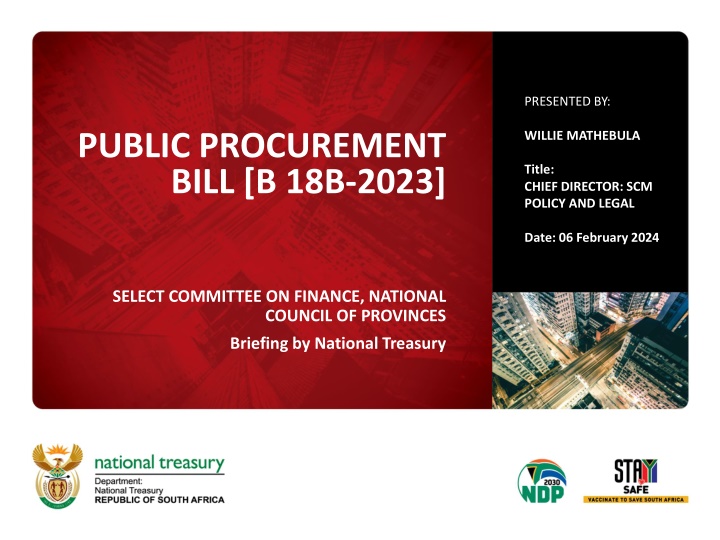



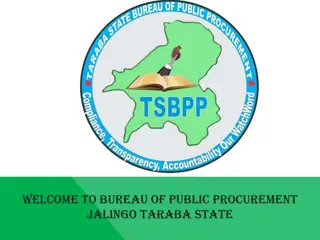
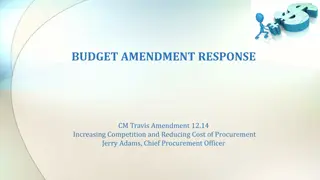
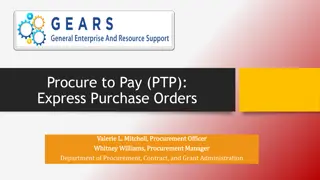
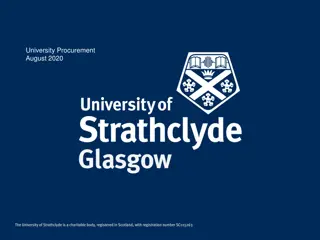
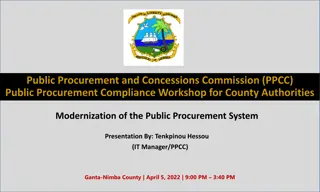
![Comprehensive Overview of Corruption Watch Submission on Public Procurement Bill [B18B-2023]](/thumb/138344/comprehensive-overview-of-corruption-watch-submission-on-public-procurement-bill-b18b-2023.jpg)
